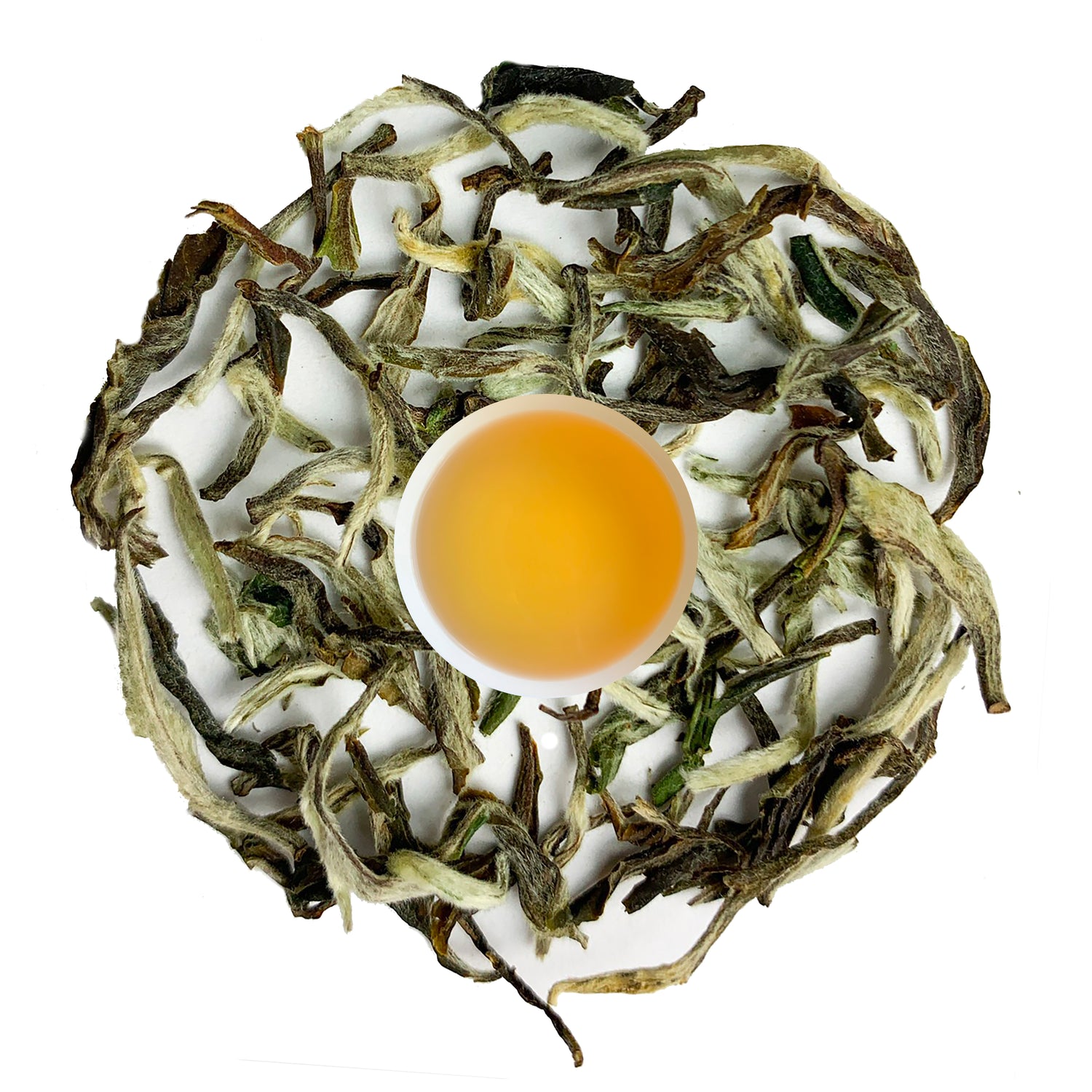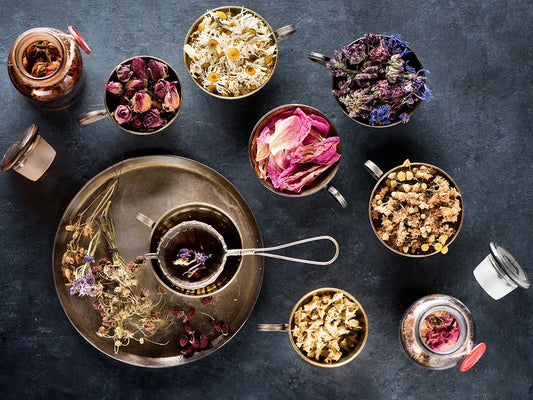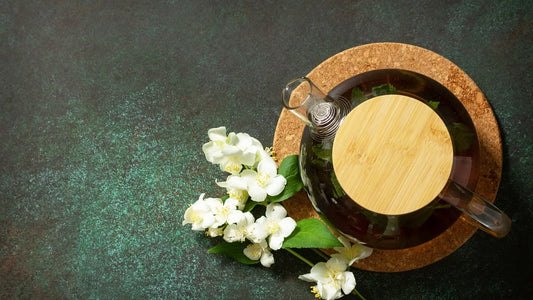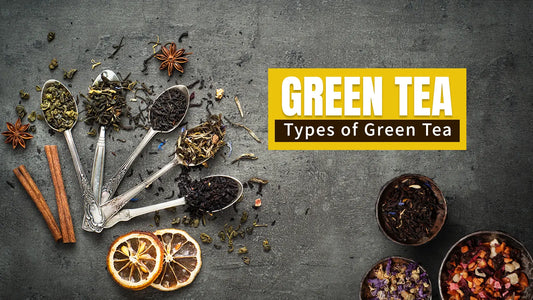Basil Tea Benefits: Unlock Tulsi Tea Benefits for Stress Relief, Immunity, and Glowing Skin

When it comes to herbs that pack a punch, tulsi—also known as holy basil or by its scientific name, Ocimum sanctum—is a true heavyweight.
For thousands of years, Ayurvedic practitioners praised tulsi for its healing properties. And today? Modern science is catching up, confirming that tulsi tea benefits everything from your stress levels to your skin glow.
Ready to meet your new daily ritual? Let’s dive into the holy basil tea benefits you need to know.
What is holy basil herb tea?
Holy Basil herb or Tulsi comes from the Ocimum Tenuiflorum plant. It’s called holy or sacred basil because it holds religious and spiritual significance.
So, holy basil herb tea is an herbal tea that has dried sacred basil leaves. It’s especially appreciated by tea drinkers for its several health benefits.
What does holy basil herb tea taste like?
Holy Basil herb tea gives off an astringent, peppery, minty, lemony, and somewhat spicy flavor with clove notes. Each type of holy basil herb offers a distinct flavor profile.
Our Danfe Tea’s Tulsi Tea (Sacred Basil Tea) offers a herbaceous flavor with a hint of camphor, giving a calming body sensation. When you smell it, you’ll get a subtle spicy aroma of cinnamon and ginger.
Types of Holy Basil Herb Tea
Krishna Holy Basil Tea
Krishna Holy Basil tea or purple leaf has distinct purple leaves, giving a peppery and clove-like fragrance.
Vana Holy Basil Tea
Vana holy basil tea offers a very lemony and citrusy flavor. Its tea leaves are light green and mostly grown in the wild.
Kapoor Holy Basil Tea
Another type is Kapoor holy basil tea which has a sweet taste profile with a unique lightly spicy aroma.
Organic Holy Basil Tea
For a healthier alternative, there’s also organic holy basil tea. This tea is made up of holy basil leaves that are grown naturally. This implies that no fertilizers or toxic chemicals are utilized. The flavor profile is similar to the other holy basil leaves.

Nutritional Goldmine: What’s in Your Cup of Tulsi Tea?
A steaming mug of tulsi tea brings you more than just cozy vibes—it delivers serious wellness perks:
-
Antioxidants like eugenol, ursolic acid, and luteolin fight inflammation and oxidative stress.
-
Vitamins A, C, and K support your skin, immunity, and overall health.
-
Minerals like iron, calcium, and zinc keep your blood, bones, and immune system strong.
-
Adaptogens help your body adapt (gracefully!) to mental and physical stress.
Pro tip: Always choose high-quality tulsi or holy basil extract to get the full spectrum of benefits. Your body deserves the good stuff.
7 Science-Backed Benefits of Holy Basil Tea
1. Reduces Stress and Anxiety
Feel like stress is your new unwanted roommate?
Tulsi’s adaptogens help regulate cortisol—the infamous stress hormone—making it your natural chill pill. Studies suggest holy basil tea may:
- Lower anxiety
- Improve mood
- Sharpen focus and mental clarity
Think of it as “liquid yoga” in a teacup.
2. Boosts Metabolism and Supports Digestion
Sipping tulsi tea regularly may:
- Improve fat metabolism
- Support liver detox
- Ease bloating and digestive woes
It’s a natural, caffeine-free pick-me-up—minus the crash and burn you get from energy drinks
3. Regulates Blood Sugar Levels
Trying to keep your blood sugar steady without obsessing over carbs all day?
Holy basil could help by:
- Enhancing insulin sensitivity
- Reducing fasting blood glucose levels
- Supporting healthy pancreatic function
Bonus: Unlike most “miracle fixes,” tulsi tastes great without needing a sugar chaser.
4. Promotes Glowing Skin and Stronger Hair
Thanks to powerful antioxidants and essential oils, tulsi can:
Reduce acne and blemishes
- Boost collagen production (hello, youthful glow!)
- Strengthen hair follicles
- Calm scalp irritation and dandruff
Tip: Use cooled tulsi tea as a DIY toner or scalp rinse. Spa day, anyone?
5. Strengthens Your Immunity
With essential oils, vitamin C, zinc, and other natural defenders, tulsi tea:
- Helps fight off viruses and bacteria
- Speeds up recovery from common illnesses
- Builds your body's natural shield against infections
Mix it with ginger, lemongrass, or rose tea for an immune-boosting blend your taste buds will thank you for.
6. Eases Breathing and Respiratory Issues
Tulsi contains compounds like cineole and camphene that:
- Act as natural decongestants
- Help ease asthma symptoms
- Calm down pesky coughs and sore throats
Perfect for allergy season... or whenever the air feels like it’s plotting against you.
7. Balances Hormones and Eases PMS Symptoms
Hormones running wild?
Holy basil tea gently helps by:
- Reducing cortisol imbalances
- Alleviating menstrual cramps
- Supporting regular cycles
Many women swear by tulsi tea benefits during their moon cycle—and honestly, who are we to argue with centuries of wisdom?
Holy Basil Tea Recipe
Commonly, holy basil tea is steeped in hot water to extract the essence of the herb. But, as per your preference, you could also put other ingredients like honey or ginger to enhance the flavor and healing properties.
You’ll Need
- 1 teaspoon of dried holy basil herb tea
- 12 fl oz of filtered water
- A saucepan
- A teacup
- A strainer
- 1 teaspoon honey (optional)
- 1 teaspoon lemon (optional)
- 1 inch fresh crushed ginger (optional)
Instructions
- Put 12 fl oz of filtered water into the saucepan and boil it.
- Add 1 teaspoon of dried holy basil herb tea into the boiling water. Turn the flame low and let the tea simmer for around 3-5 minutes.
- If you want, add the ingredients.
- Now, pour tea into your cup using a strainer.
If you want a unique taste, you can try other holy basil herb tea recipes like holy basil cinnamon tea, holy basil mint tea, holy basil lemon tea, holy basil iced tea, etc.

How to make basil tea with fresh basil?
Preparing fresh basil tea is easy and similar to the recipe we’ve covered above. For those who have fresh basil leaves instead of dried ones, you may follow the given instructions.
- First, boil the filtered water.
- Finely chop the fresh basil.
- Measure 1 teaspoon of holy fresh basil and put it into the boiling water.
- Add other ingredients if you want.
- Steep the tea for 3-5 minutes and serve.

Holy Basil Herb Tea Health Benefits
Holy basil herb tea is a nutrient-rich herb. It has abundant vitamins and minerals like vitamin K, vitamin A, vitamin C, calcium, etc. Holy basil herb is also considered an adaptogen. By drinking this tea, you might get the following potential benefits.
May Support in Detoxification
Since holy basil is packed with antioxidants, it might help in detoxification. It could also support protecting the body from oxidative stress.
May Protect from Infection
Studies have discovered that holy basil leaves contain anti-bacterial, anti-viral, and antifungal activity. So, drinking holy basil leave tea might help to protect humans against infections by enhancing the immune system.
Might Help to Reduce Stress
Holy basil tea’s adaptogenic properties might help to reduce cortisol levels which leads to relieving stress. It may have the potential capability to treat stressful conditions.
May Improve Dental Health
Holy basil tea contains antioxidant and antibacterial properties like rosmarinic acid. These properties could help to minimize inflammation and protect your teeth from plaque buildup.
Could Help with Respiratory Problems
Holy basil’s bioactive properties like camphene and cineole might help with respiratory problems such as asthma, bronchitis, etc. It could also have healing properties for common cold symptoms.
Side Effects and Precautions: A Quick Heads-Up
While tulsi tea is generally safe, a few notes of caution:
- Blood thinning: If you're on blood thinners, check with your doctor.
- Pregnancy/Nursing: Always consult a healthcare provider first.
- Low blood sugar: Monitor levels if you’re diabetic.
- Allergies: Rare, but possible. If tulsi doesn’t vibe with you, stop drinking it.

Conclusion
For over 5000 years, holy basil herb has been consumed as a healing herb, especially in Ayurveda. Consuming holy basil as tea might provide you with the maximum nutrients. Since it is also considered a source of vitamins and minerals, it could have antioxidant and anti-inflammatory effects.
At Danfe Tea, we offer Tulsi Tea (Sacred Basil tea) mixed with rich spices and herbs like lemongrass, long pepper, ginger, cloves, cardamom, and many more. Try today to experience the taste of rich herbs with their benefits.








